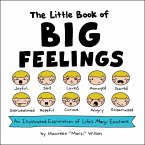- Broschiertes Buch
- Merkliste
- Auf die Merkliste
- Bewerten Bewerten
- Teilen
- Produkt teilen
- Produkterinnerung
- Produkterinnerung
Bell argues that contempt has an important role to play in confronting and addressing immorality, and in that respect is essential to moral relations. Her book is not just a defense of contempt, but an account of the virtues and vices of it, providing a model for thinking more generally about the negative emotions as a response to vice.
Andere Kunden interessierten sich auch für
![Toxic Positivity Toxic Positivity]() Whitney GoodmanToxic Positivity12,99 €
Whitney GoodmanToxic Positivity12,99 €![The Little Book of Big Feelings The Little Book of Big Feelings]() Maureen Marzi WilsonThe Little Book of Big Feelings12,99 €
Maureen Marzi WilsonThe Little Book of Big Feelings12,99 €![Languishing Languishing]() Corey KeyesLanguishing16,14 €
Corey KeyesLanguishing16,14 €![On Consolation On Consolation]() Michael IgnatieffOn Consolation15,99 €
Michael IgnatieffOn Consolation15,99 €![On Consolation On Consolation]() Michael IgnatieffOn Consolation8,49 €
Michael IgnatieffOn Consolation8,49 €![Emotions for Kids age 1-3 (Engage Early Readers Emotions for Kids age 1-3 (Engage Early Readers]() Dayna MartinEmotions for Kids age 1-3 (Engage Early Readers26,99 €
Dayna MartinEmotions for Kids age 1-3 (Engage Early Readers26,99 €![Human Feelings Human Feelings]() Human Feelings68,99 €
Human Feelings68,99 €-
-
-
Bell argues that contempt has an important role to play in confronting and addressing immorality, and in that respect is essential to moral relations. Her book is not just a defense of contempt, but an account of the virtues and vices of it, providing a model for thinking more generally about the negative emotions as a response to vice.
Hinweis: Dieser Artikel kann nur an eine deutsche Lieferadresse ausgeliefert werden.
Hinweis: Dieser Artikel kann nur an eine deutsche Lieferadresse ausgeliefert werden.
Produktdetails
- Produktdetails
- Verlag: Oxford University Press
- Seitenzahl: 308
- Erscheinungstermin: 1. November 2018
- Englisch
- Abmessung: 210mm x 140mm x 19mm
- Gewicht: 425g
- ISBN-13: 9780190929558
- ISBN-10: 0190929553
- Artikelnr.: 55321006
- Herstellerkennzeichnung
- Libri GmbH
- Europaallee 1
- 36244 Bad Hersfeld
- gpsr@libri.de
- Verlag: Oxford University Press
- Seitenzahl: 308
- Erscheinungstermin: 1. November 2018
- Englisch
- Abmessung: 210mm x 140mm x 19mm
- Gewicht: 425g
- ISBN-13: 9780190929558
- ISBN-10: 0190929553
- Artikelnr.: 55321006
- Herstellerkennzeichnung
- Libri GmbH
- Europaallee 1
- 36244 Bad Hersfeld
- gpsr@libri.de
Macalester Bell is Associate Professor of Philosophy at Bryn Mawr College. Her published papers take up fundamental questions concerning anger, blame, forgiveness, reparation, and inspiration.
Introduction: The Moral Importance Of Contempt
Chapter 1: What Is Contempt?
1.1 Contempt And Feeling Theories Of Emotion
1.2 Intentionality, Rationality, And Cognitive Theories Of
Emotion
1.3 Contempt's Evaluative Presentation
1.4 Active And Passive Contempt
1.5 Contempt, Hatred And Disgust
1.5.1 Contempt And Disgust
1.5.2 Contempt And Hatred
1.6 Potential Problem Cases
1.6.1 Contempt For Non-Persons
1.6.2 Self-Contempt
Chapter 2: Contempt As A Fitting Globalist Emotion
2.1 Can Contempt Ever Fit Its Target?
2.2 Defending Contempt Against The Fittingness Objection
2.3 Fitting Evaluative Prioritizations
2.4 Relationships, Fittingness, And Fitting Attitude
Accounts Of Value
Chapter 3: Contempt And The Vices Of Superiority
3.1 Superbia And Vices Of Superiority
3.2 Hypocrisy And Arrogance
3.3 Contempt As An Answer To Vices Of Superiority
3.4 Cowardice, Stupidity, And Lightheartedness
Chapter 4: The Moral Value Of Contempt
4.1 Passive Contempt In Aristotle And Nietzsche
4.2 Contempt's Aptness Conditions
4.3 Contempt's Moral Value
4.3.1 Contempt's Instrumental Value
4.3.2 Contempt's Non-Instrumental Value
4.4 Challenges To An Ethic Of Contempt
4.4.1 Contempt's Globalism And Aptness
4.4.2 Respect-Based Arguments Against Contempt
4.4.3 Contempt And Comparisons
4.4.4 Withdrawal And Moral Address
4.5 Do We Have An Obligation To Contemn?
Chapter 5: Contempt, Racism, And Civility's Limits
5.1. Contempt And Anti-Black Racism: The Case Of The
Obama Bucks Cartoon
5.2 Race-Based Contempt As A Vice
5.3 Race-Based Contempt As Unfitting
5.4 Race-Based Contempt As Inapt
5.5 Contempt And Civility
Chapter 6: Contempt, Forgiveness, And Reconciliation
6.1 A Problem With The Standard Account Of Forgiveness
6.2 The Fundamental Features Of Forgiveness
6.3 The Standard Account Of Our Reasons To Forgive
6.3.1 Repentance
6.3.2 Excuses And Good Intentions
6.4 Reasons To Overcome Contempt Through Forgiveness
6.4.1 Character Transformation
6.4.2 Shame
6.5 Do We Genuinely Forgive In Overcoming Contempt?
6.6 Contempt, Symbolic Reparations And Social
Reconciliation
Conclusion: "Contempt Is Not A Thing to Be Despised"
Bibliography
Chapter 1: What Is Contempt?
1.1 Contempt And Feeling Theories Of Emotion
1.2 Intentionality, Rationality, And Cognitive Theories Of
Emotion
1.3 Contempt's Evaluative Presentation
1.4 Active And Passive Contempt
1.5 Contempt, Hatred And Disgust
1.5.1 Contempt And Disgust
1.5.2 Contempt And Hatred
1.6 Potential Problem Cases
1.6.1 Contempt For Non-Persons
1.6.2 Self-Contempt
Chapter 2: Contempt As A Fitting Globalist Emotion
2.1 Can Contempt Ever Fit Its Target?
2.2 Defending Contempt Against The Fittingness Objection
2.3 Fitting Evaluative Prioritizations
2.4 Relationships, Fittingness, And Fitting Attitude
Accounts Of Value
Chapter 3: Contempt And The Vices Of Superiority
3.1 Superbia And Vices Of Superiority
3.2 Hypocrisy And Arrogance
3.3 Contempt As An Answer To Vices Of Superiority
3.4 Cowardice, Stupidity, And Lightheartedness
Chapter 4: The Moral Value Of Contempt
4.1 Passive Contempt In Aristotle And Nietzsche
4.2 Contempt's Aptness Conditions
4.3 Contempt's Moral Value
4.3.1 Contempt's Instrumental Value
4.3.2 Contempt's Non-Instrumental Value
4.4 Challenges To An Ethic Of Contempt
4.4.1 Contempt's Globalism And Aptness
4.4.2 Respect-Based Arguments Against Contempt
4.4.3 Contempt And Comparisons
4.4.4 Withdrawal And Moral Address
4.5 Do We Have An Obligation To Contemn?
Chapter 5: Contempt, Racism, And Civility's Limits
5.1. Contempt And Anti-Black Racism: The Case Of The
Obama Bucks Cartoon
5.2 Race-Based Contempt As A Vice
5.3 Race-Based Contempt As Unfitting
5.4 Race-Based Contempt As Inapt
5.5 Contempt And Civility
Chapter 6: Contempt, Forgiveness, And Reconciliation
6.1 A Problem With The Standard Account Of Forgiveness
6.2 The Fundamental Features Of Forgiveness
6.3 The Standard Account Of Our Reasons To Forgive
6.3.1 Repentance
6.3.2 Excuses And Good Intentions
6.4 Reasons To Overcome Contempt Through Forgiveness
6.4.1 Character Transformation
6.4.2 Shame
6.5 Do We Genuinely Forgive In Overcoming Contempt?
6.6 Contempt, Symbolic Reparations And Social
Reconciliation
Conclusion: "Contempt Is Not A Thing to Be Despised"
Bibliography
Introduction: The Moral Importance Of Contempt
Chapter 1: What Is Contempt?
1.1 Contempt And Feeling Theories Of Emotion
1.2 Intentionality, Rationality, And Cognitive Theories Of
Emotion
1.3 Contempt's Evaluative Presentation
1.4 Active And Passive Contempt
1.5 Contempt, Hatred And Disgust
1.5.1 Contempt And Disgust
1.5.2 Contempt And Hatred
1.6 Potential Problem Cases
1.6.1 Contempt For Non-Persons
1.6.2 Self-Contempt
Chapter 2: Contempt As A Fitting Globalist Emotion
2.1 Can Contempt Ever Fit Its Target?
2.2 Defending Contempt Against The Fittingness Objection
2.3 Fitting Evaluative Prioritizations
2.4 Relationships, Fittingness, And Fitting Attitude
Accounts Of Value
Chapter 3: Contempt And The Vices Of Superiority
3.1 Superbia And Vices Of Superiority
3.2 Hypocrisy And Arrogance
3.3 Contempt As An Answer To Vices Of Superiority
3.4 Cowardice, Stupidity, And Lightheartedness
Chapter 4: The Moral Value Of Contempt
4.1 Passive Contempt In Aristotle And Nietzsche
4.2 Contempt's Aptness Conditions
4.3 Contempt's Moral Value
4.3.1 Contempt's Instrumental Value
4.3.2 Contempt's Non-Instrumental Value
4.4 Challenges To An Ethic Of Contempt
4.4.1 Contempt's Globalism And Aptness
4.4.2 Respect-Based Arguments Against Contempt
4.4.3 Contempt And Comparisons
4.4.4 Withdrawal And Moral Address
4.5 Do We Have An Obligation To Contemn?
Chapter 5: Contempt, Racism, And Civility's Limits
5.1. Contempt And Anti-Black Racism: The Case Of The
Obama Bucks Cartoon
5.2 Race-Based Contempt As A Vice
5.3 Race-Based Contempt As Unfitting
5.4 Race-Based Contempt As Inapt
5.5 Contempt And Civility
Chapter 6: Contempt, Forgiveness, And Reconciliation
6.1 A Problem With The Standard Account Of Forgiveness
6.2 The Fundamental Features Of Forgiveness
6.3 The Standard Account Of Our Reasons To Forgive
6.3.1 Repentance
6.3.2 Excuses And Good Intentions
6.4 Reasons To Overcome Contempt Through Forgiveness
6.4.1 Character Transformation
6.4.2 Shame
6.5 Do We Genuinely Forgive In Overcoming Contempt?
6.6 Contempt, Symbolic Reparations And Social
Reconciliation
Conclusion: "Contempt Is Not A Thing to Be Despised"
Bibliography
Chapter 1: What Is Contempt?
1.1 Contempt And Feeling Theories Of Emotion
1.2 Intentionality, Rationality, And Cognitive Theories Of
Emotion
1.3 Contempt's Evaluative Presentation
1.4 Active And Passive Contempt
1.5 Contempt, Hatred And Disgust
1.5.1 Contempt And Disgust
1.5.2 Contempt And Hatred
1.6 Potential Problem Cases
1.6.1 Contempt For Non-Persons
1.6.2 Self-Contempt
Chapter 2: Contempt As A Fitting Globalist Emotion
2.1 Can Contempt Ever Fit Its Target?
2.2 Defending Contempt Against The Fittingness Objection
2.3 Fitting Evaluative Prioritizations
2.4 Relationships, Fittingness, And Fitting Attitude
Accounts Of Value
Chapter 3: Contempt And The Vices Of Superiority
3.1 Superbia And Vices Of Superiority
3.2 Hypocrisy And Arrogance
3.3 Contempt As An Answer To Vices Of Superiority
3.4 Cowardice, Stupidity, And Lightheartedness
Chapter 4: The Moral Value Of Contempt
4.1 Passive Contempt In Aristotle And Nietzsche
4.2 Contempt's Aptness Conditions
4.3 Contempt's Moral Value
4.3.1 Contempt's Instrumental Value
4.3.2 Contempt's Non-Instrumental Value
4.4 Challenges To An Ethic Of Contempt
4.4.1 Contempt's Globalism And Aptness
4.4.2 Respect-Based Arguments Against Contempt
4.4.3 Contempt And Comparisons
4.4.4 Withdrawal And Moral Address
4.5 Do We Have An Obligation To Contemn?
Chapter 5: Contempt, Racism, And Civility's Limits
5.1. Contempt And Anti-Black Racism: The Case Of The
Obama Bucks Cartoon
5.2 Race-Based Contempt As A Vice
5.3 Race-Based Contempt As Unfitting
5.4 Race-Based Contempt As Inapt
5.5 Contempt And Civility
Chapter 6: Contempt, Forgiveness, And Reconciliation
6.1 A Problem With The Standard Account Of Forgiveness
6.2 The Fundamental Features Of Forgiveness
6.3 The Standard Account Of Our Reasons To Forgive
6.3.1 Repentance
6.3.2 Excuses And Good Intentions
6.4 Reasons To Overcome Contempt Through Forgiveness
6.4.1 Character Transformation
6.4.2 Shame
6.5 Do We Genuinely Forgive In Overcoming Contempt?
6.6 Contempt, Symbolic Reparations And Social
Reconciliation
Conclusion: "Contempt Is Not A Thing to Be Despised"
Bibliography









